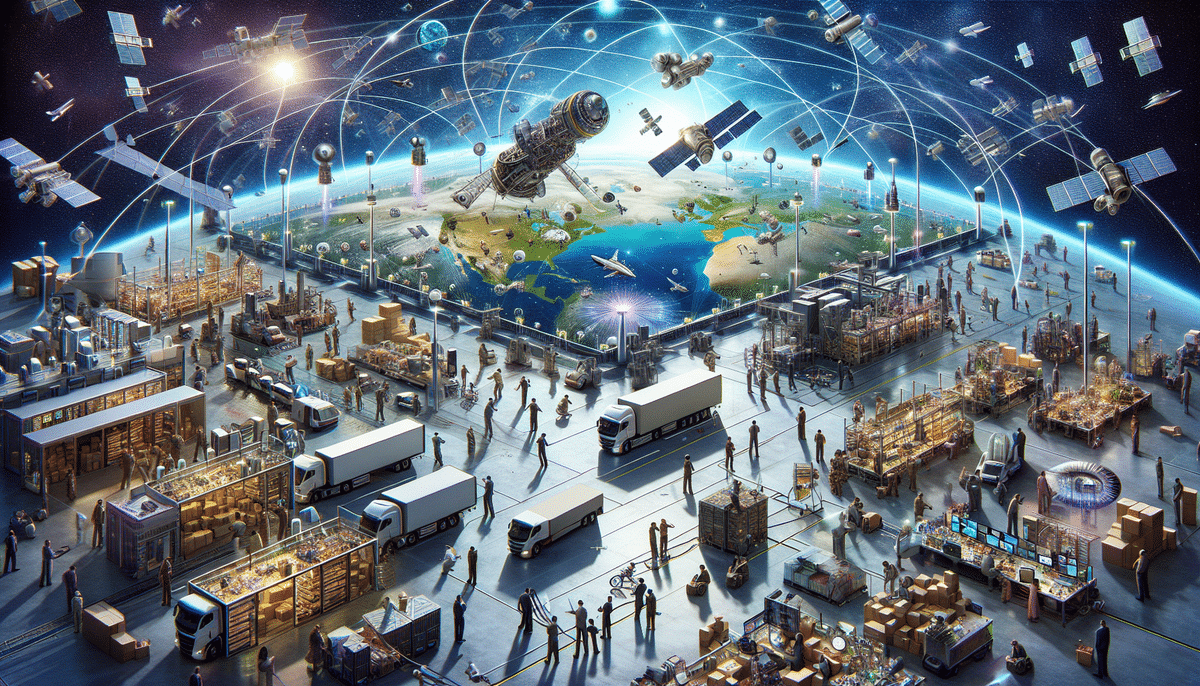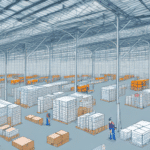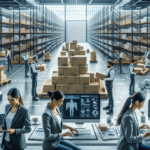A Comprehensive Overview of 3PL Logistics Fulfillment and the Features of Space Logistics
For business owners, ensuring the efficient delivery of products to customers is paramount. In recent years, 3PL logistics fulfillment has become a popular solution for businesses seeking cost-effective distribution methods. Additionally, space logistics has emerged as a futuristic approach to overcoming many shipping challenges. This comprehensive article explores the intricacies of 3PL logistics fulfillment and the innovative features of space logistics, providing insights on how these solutions can benefit your business.
What is 3PL Logistics Fulfillment?
Third-party logistics (3PL) refers to the outsourcing of logistics and supply chain management functions to a specialized provider. A 3PL provider typically handles the storage, transportation, and delivery of a company’s goods, allowing businesses to focus on their core operations and enhance overall productivity.
3PL logistics fulfillment providers offer a wide range of services, including:
- Inventory management
- Order processing
- Customer service
- Shipment tracking with real-time updates
By partnering with a 3PL provider, businesses can leverage the provider’s expertise and industry experience, resulting in reduced costs and improved efficiency. Advanced technologies, such as automation and data analytics, enable 3PL providers to optimize operations and offer scalable solutions tailored to business needs.
The Evolution of 3PL Logistics Fulfillment
The 3PL logistics fulfillment model has significantly evolved over the past decade. Previously, businesses often collaborated with multiple providers for different segments of the supply chain, leading to delays and increased complexity. Today, 3PL providers offer comprehensive services, including inbound and outbound logistics, reverse logistics, and transportation management, serving as a one-stop solution for businesses.
Technological advancements have been pivotal in this evolution. The integration of automation, artificial intelligence (AI), and data analytics allows 3PL providers to enhance operational efficiency and offer cost-effective solutions. Increased visibility and transparency in the supply chain empower businesses to make data-driven decisions, improving overall performance.
Benefits of Using 3PL Logistics Fulfillment
Utilizing 3PL logistics fulfillment offers numerous advantages:
- Time and Resource Savings: Outsourcing logistics allows businesses to focus on core competencies while reducing overhead costs.
- Advanced Technology: 3PL providers use state-of-the-art technologies and analytics to optimize services and ensure timely deliveries.
- Flexibility and Scalability: As businesses grow, 3PL providers can adjust services to meet evolving needs, such as expanding warehouse space or integrating new transportation options.
- Enhanced Customer Service: Faster and more efficient deliveries improve the overall customer experience. Value-added services like order tracking, returns management, and customer support further boost customer satisfaction and brand loyalty.
According to a 2023 survey by the Supply Chain Management Review, businesses that leveraged 3PL services saw an average increase in operational efficiency by 20% and a reduction in logistics costs by 15%.
Types of 3PL Logistics Fulfillment Providers
There are several types of 3PL logistics fulfillment providers, each offering distinct services:
- Transportation-based 3PLs: Specialize in shipping and transport management.
- Warehousing-based 3PLs: Provide storage and warehousing facilities.
- Freight-forwarding 3PLs: Manage international transportation of goods.
Additionally, specialized 3PL providers cater to specific industries. For instance, healthcare-focused 3PLs handle and transport medical supplies and equipment, while e-commerce 3PLs manage online orders and returns.
Emerging trends in the 3PL industry include the adoption of software solutions that offer real-time shipment tracking, inventory management, and predictive analytics, enabling businesses to make informed supply chain decisions.
How to Choose the Right 3PL Logistics Fulfillment Provider for Your Business
Selecting the appropriate 3PL logistics fulfillment provider depends on your business’s specific requirements. Consider the following factors:
- Experience and Expertise: Evaluate the provider’s track record and industry knowledge.
- Service Offerings: Ensure the provider offers the necessary services that align with your business needs.
- Technology and Infrastructure: Assess the provider’s technological capabilities and infrastructure.
- Scalability: Choose a provider that can scale services as your business grows.
- Customer Service: Opt for a provider that offers responsive and communicative customer support, along with regular shipment updates.
It's crucial to select a 3PL provider that can accommodate any unique or special requests specific to your business operations.
What is Space Logistics and How Does it Work?
Space logistics involves the use of outer space for transportation and logistics purposes, utilizing satellites, space stations, and other spacecraft to deliver goods and services. This innovative approach leverages space assets in low-Earth orbit to offer a faster and more efficient alternative to traditional shipping and logistics methods.
Key advantages of space logistics include:
- Bypassing Traditional Infrastructure: Space logistics can bypass roads and ports, reducing transit times and congestion.
- Transporting Difficult Goods: Capable of transporting hazardous materials or large equipment that are challenging via traditional means.
However, space logistics faces challenges such as high costs associated with launching and maintaining spacecraft and environmental concerns related to increased space activities. Despite these hurdles, significant investments in space logistics research and development indicate promising advancements in the near future.
The Benefits and Challenges of Space Logistics
Space logistics offers several benefits:
- Reduced Transit Times: Faster delivery compared to traditional methods.
- Decreased Costs: Potential for lower long-term transportation costs despite high initial investments.
- Enhanced Supply Chain Security: Reduced reliance on terrestrial infrastructure increases resilience.
Challenges include:
- High Investment Costs: Expensive to develop and maintain space-based logistics systems.
- Regulatory Hurdles: Navigating international space laws and regulations.
- Technical Complexities: Ensuring reliable and safe transportation in the harsh space environment.
Despite these challenges, space logistics has the potential to revolutionize the transportation of goods and materials, supporting industries such as mining, manufacturing, and space tourism.
The Future of Space Logistics
The future of space logistics is promising, with the potential to transform global supply chains by enabling the transportation of goods over vast distances without the limitations of traditional methods. This could significantly benefit industries reliant on the timely and efficient movement of raw materials and finished products.
Astronautical advancements are making space more accessible, allowing businesses to explore new supply chain solutions that enhance speed and efficiency. Innovations like reusable rockets and advancements in spacecraft technology are driving down costs and improving the feasibility of space logistics.
However, challenges such as high launch costs, the need for specialized equipment, and environmental concerns must be addressed to fully realize the potential of space logistics. Ongoing research and international collaboration are crucial for overcoming these obstacles and advancing the field.
How Space Logistics Can Benefit Your Business
Integrating space logistics into your business operations can offer several benefits:
- Faster Deliveries: Significant reduction in transit times compared to traditional shipping methods.
- Increased Security: Enhanced protection against terrestrial disruptions and interference.
- Reduced Carbon Footprint: Potential for more environmentally friendly transportation options.
- Access to Remote Areas: Ability to reach locations that are otherwise difficult or impossible to access.
Additionally, space logistics enables research and development in microgravity environments, fostering the creation of innovative products and technologies. It also presents opportunities for international collaboration, as space exploration is a global endeavor requiring partnerships and shared resources.
Comparison Between Traditional and Space Logistics
When comparing traditional logistics to space logistics, it is essential to recognize the distinct advantages and disadvantages of each:
| Aspect | Traditional Logistics | Space Logistics |
|---|---|---|
| Delivery Speed | Suitable for shorter distances with moderate delivery times. | Offers extremely fast delivery times, potentially within hours. |
| Cost | Generally lower costs due to established infrastructure. | High initial costs associated with space travel and equipment. |
| Security | Vulnerable to terrestrial disruptions and theft. | Enhanced security with reduced risk of terrestrial interference. |
| Environmental Impact | More environmentally friendly with established sustainable practices. | Potential environmental concerns related to rocket launches and space debris. |
While traditional logistics benefits from a well-established infrastructure and lower costs, space logistics promises unparalleled speed and security, making it a complementary solution for specific high-value or time-sensitive deliveries.
Case Studies: Successful Applications of Space Logistics
Despite being in its early stages, space logistics has seen successful applications:
- Cygnus Spacecraft: In 2019, the Cygnus spacecraft successfully delivered supplies to the International Space Station (ISS) as part of a resupply mission.
- SpaceX: SpaceX has announced plans to utilize space logistics for providing satellite internet services, demonstrating the practical applications of space-based transportation.
These examples illustrate the potential of space logistics to support critical missions and commercial services, paving the way for broader adoption in the future.
The Role of Technology in Enhancing 3PL and Space Logistics
Technology plays a crucial role in optimizing both 3PL and space logistics:
- Artificial Intelligence & Machine Learning: Enhance predictive analytics and decision-making processes.
- Internet of Things (IoT): Enables real-time tracking and monitoring of shipments.
- Blockchain Technology: Provides secure and transparent transaction records.
- Automation: Streamlines operations, reducing human error and increasing efficiency.
These technological advancements facilitate more efficient supply chain management, improve accuracy in logistics operations, and enable innovative solutions for complex transportation challenges.
Common Misconceptions about 3PL and Space Logistics
There are several misconceptions surrounding 3PL logistics fulfillment and space logistics:
- Expensive Solutions: Many believe that 3PL and space logistics are only viable for large enterprises. In reality, both solutions can be scaled to fit businesses of all sizes and budgets.
- Limited Flexibility: It's a misconception that outsourced logistics are inflexible. 3PL providers often offer customizable services to meet specific business needs.
- Space Logistics is Impractical: While space logistics is still developing, ongoing advancements are making it increasingly feasible and practical for commercial use.
Understanding the true capabilities and scalability of these logistics solutions can help businesses make informed decisions about integrating them into their operations.
Conclusion: The Future of Fulfillment Lies in Innovative Solutions
As businesses continue to grow and navigate complex supply chains, the demand for innovative logistics solutions becomes increasingly critical. 3PL logistics fulfillment and space logistics represent two cutting-edge approaches that offer faster, more efficient, and cost-effective methods for delivering goods and services.
The benefits of these solutions are evident, from enhanced operational efficiency and scalability to the potential for revolutionizing global supply chains. As technology advances, we can anticipate even more exciting developments in the logistics industry, driving the future of fulfillment towards greater innovation and effectiveness.








